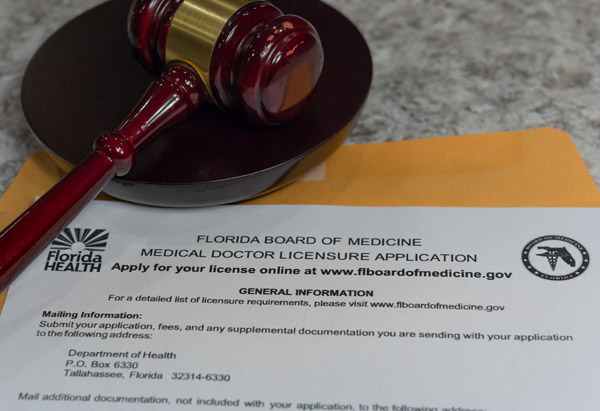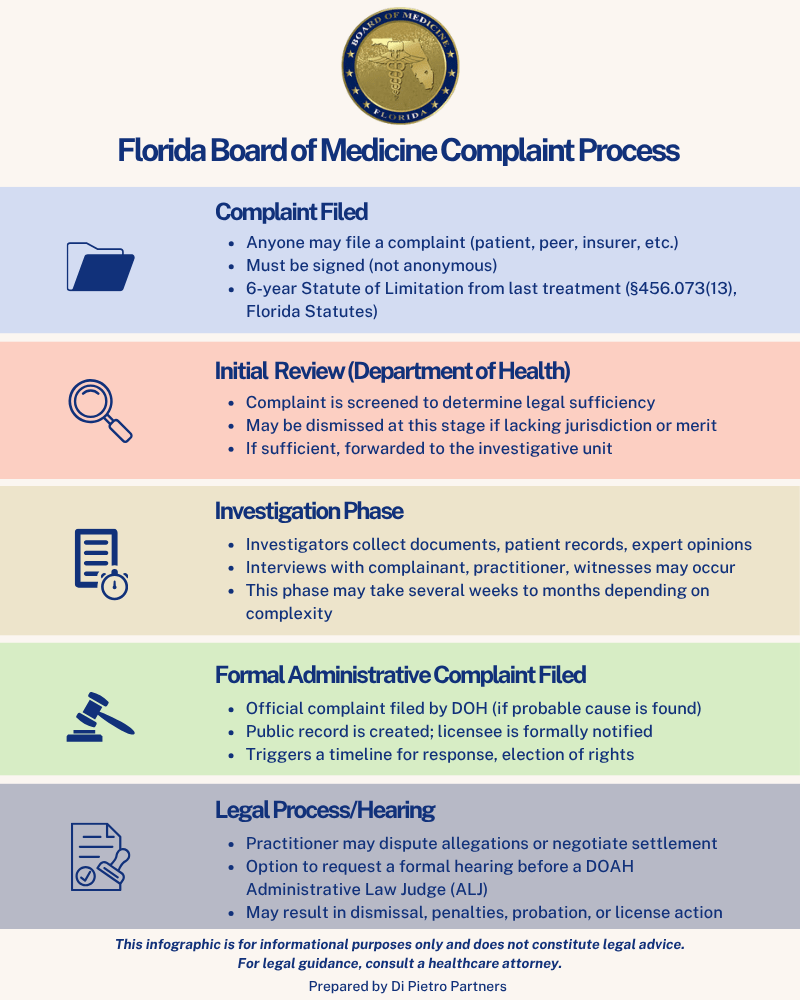Unfortunately, there are times when a physician or medical practitioner makes mistakes or is accused of malpractice during the course of practicing medicine. These mistakes or wrongdoings often result in grievances which are filed with the Florida Department of Health as formal complaints. These complaints can result in serious problems for healthcare practitioners such as fines, restrictions on their practice and even medical license suspension or revocation.
It is important for medical professionals to understand the laws and rules surrounding the complaint process in order to prevent unnecessary hardship in their practice and careers. Often, it is wise to consult a healthcare law attorney that’s experienced in Florida medical board complaints in order to take advantage of their skills and expertise.
Details Surrounding Complaints

In Florida, complaints can be filed against medical practitioners for wrongdoing committed during their practice of medicine, or against the practices of their office. These complaints can result in the regulatory board taking the following actions being against a doctor, physician or other medical professional:
- Imposition of fines
- Restriction of practice
- Probation
- Reprimands
- Remedial education
- Medical license suspension or revocation
These administrative actions can seriously limit a medical professional’s ability to perform their job and their ability to run their practice. In certain circumstances, they can even force a practice to close down and terminate a doctor’s ability to practice medicine permanently. It should be noted that disputes involving fees, issues of manners or rudeness of practitioners and personality conflicts are not covered under this complaint process and will not be investigated.
Time Period for Filing
In order to successfully file a complaint against a medical practitioner, the complaint must be submitted within the time period allotted in statute of limitations (SOL). If the incident was after July 1, 2006, the SOL is six years from the last date of treatment. Because of this limited time period, it is essential that the investigation and finding of probable cause be completed prior to the expiration of the SOL. For incidents before July 1, 2006 there’s no limit. There are exceptions to this SOL under special circumstances, which are outlined under section 456.073(13).

Frequently Asked Questions
Q. Do I need an attorney if a complaint is filed against me?
Yes. Even seemingly minor complaints can escalate into serious disciplinary actions. An experienced healthcare attorney can protect your license, guide you through the investigation, and advocate on your behalf throughout the process.
Q. Will I be notified if someone files a complaint against me?
Yes. If the Florida Department of Health determines that a complaint warrants investigation, you will receive formal notice and be given an opportunity to respond. It’s critical to consult legal counsel immediately upon receiving notification.
Q. Are complaints against me public?
Not initially. Complaints remain confidential until 10 days after a finding of probable cause. If no probable cause is found, the complaint remains permanently confidential. However, if probable cause is found, the complaint becomes public record and may appear on your license profile.
Q. What types of allegations can lead to disciplinary action?
Common allegations include improper prescribing, medical errors, unprofessional conduct, or violation of state or federal regulations. Not all complaints result in discipline, but each should be taken seriously.
Q. What are the possible outcomes of a complaint?
Outcomes range from case dismissal to formal discipline such as fines, practice restrictions, probation, remedial education, suspension, or revocation of your license.
Q. Can a complaint be dismissed without action?
Yes. Many complaints are dismissed during the early stages if they lack merit, fall outside the Board’s jurisdiction, or fail to demonstrate a legal violation. A skilled attorney can help frame your response to increase the likelihood of dismissal.
Q. How long does the investigation process take?
Timelines vary depending on the complexity of the complaint. Investigations typically take several months, but serious cases may take a year or more to resolve.
Q. Will this affect my hospital privileges or employment?
Potentially. Even before a complaint is resolved, pending investigations may impact credentialing, employment contracts, or insurance panel participation. Early legal intervention can help mitigate reputational damage.
Q. What if I suspect the complaint is retaliatory or false?
Unfounded or malicious complaints still require a formal response. Your attorney can present evidence to challenge the credibility or motives of the complainant and seek early case closure.
How a Lawyer For Healthcare Law Can Help
Handling a Florida Board of Medicine Complaint is a difficult and time consuming process for most practitioners and healthcare facilities. An experienced lawyer specializing in malpractice and healthcare law can help medical professionals navigate this complicated process and ensure that they receive the best outcome possible. In certain cases the assistance provided by an attorney can mean the difference between the success or failure of their practice and medical careers.
Di Pietro Partners specializes in healthcare law, and has the knowledge and experience necessary to make sure you and your practice have the best possible outcome from a complaint. Our team of talented attorneys and legal professionals have years of experience on both sides of healthcare law issues and will ensure that you are treated fairly during a Department of Health investigation. Please reach out today to ensure your practice and healthcare career is protected.